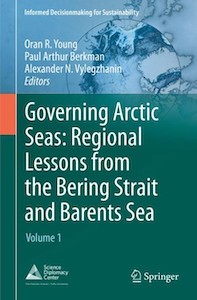Books
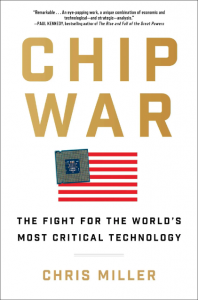 Chip War: The Fight for the World’s Most Critical Technology (Chris Miller, 2022)
Chip War: The Fight for the World’s Most Critical Technology (Chris Miller, 2022)
An epic account of the decades-long battle to control what has emerged as the world’s most critical resource—microchip technology—with the United States and China increasingly in conflict.
You may be surprised to learn that microchips are the new oil—the scarce resource on which the modern world depends. Today, military, economic, and geopolitical power are built on a foundation of computer chips. Virtually everything—from missiles to microwaves, smartphones to the stock market—runs on chips. Until recently, America designed and built the fastest chips and maintained its lead as the #1 superpower. Now, America’s edge is slipping, undermined by competitors in Taiwan, Korea, Europe, and, above all, China. Today, as Chip War reveals, China, which spends more money each year importing chips than it spends importing oil, is pouring billions into a chip-building initiative to catch up to the US. At stake is America’s military superiority and economic prosperity.
Economic historian Chris Miller explains how the semiconductor came to play a critical role in modern life and how the U.S. become dominant in chip design and manufacturing and applied this technology to military systems. America’s victory in the Cold War and its global military dominance stems from its ability to harness computing power more effectively than any other power. But here, too, China is catching up, with its chip-building ambitions and military modernization going hand in hand. America has let key components of the chip-building process slip out of its grasp, contributing not only to a worldwide chip shortage but also a new Cold War with a superpower adversary that is desperate to bridge the gap.
Illuminating, timely, and fascinating, Chip War shows that, to make sense of the current state of politics, economics, and technology, we must first understand the vital role played by chips.
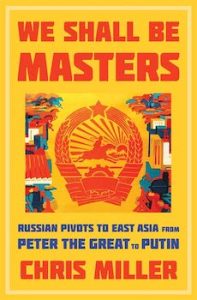 We Shall Be Masters: Russian Pivots to East Asia from Peter the Great to Putin (Chris Miller, 2021)
We Shall Be Masters: Russian Pivots to East Asia from Peter the Great to Putin (Chris Miller, 2021)
Since Peter the Great, Russian leaders have been lured by opportunity to the East. Under the tsars, Russians colonized Alaska, California, and Hawaii. The Trans-Siberian Railway linked Moscow to Vladivostok. And Stalin looked to Asia as a sphere of influence, hospitable to the spread of Soviet Communism. In Asia and the Pacific lay territory, markets, security, and glory.
But all these expansionist dreams amounted to little. In We Shall Be Masters, Chris Miller explores why, arguing that Russia’s ambitions have repeatedly outstripped its capacity. With the core of the nation concentrated thousands of miles away in the European borderlands, Russia’s would-be pioneers have always struggled to project power into Asia and to maintain public and elite interest in their far-flung pursuits. Even when the wider population professed faith in Asia’s promise, few Russians were willing to pay the steep price. Among leaders, too, dreams of empire have always been tempered by fears of cost. Most of Russia’s pivots to Asia have therefore been halfhearted and fleeting.
Today the Kremlin talks up the importance of “strategic partnership” with Xi Jinping’s China, and Vladimir Putin’s government is at pains to emphasize Russian activities across Eurasia. But while distance is covered with relative ease in the age of air travel and digital communication, the East remains far off in the ways that matter most. Miller finds that Russia’s Asian dreams are still restrained by the country’s firm rooting in Europe.
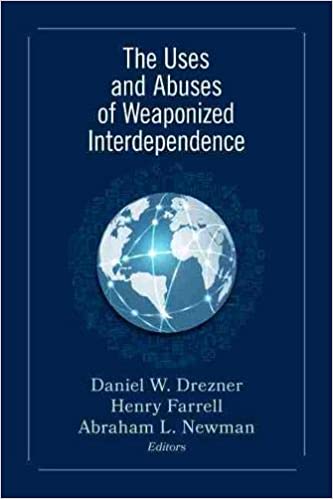 The Uses and Abuses of Weaponized Interdependence (Edited by Daniel W. Drezner, Henry Farrell, Abraham L. Newman, 2021)
The Uses and Abuses of Weaponized Interdependence (Edited by Daniel W. Drezner, Henry Farrell, Abraham L. Newman, 2021)
Until recently, globalization was viewed, on balance, as an inherently good thing that would benefit people and societies nearly everywhere. Now there is growing concern that some countries will use their position in globalized networks to gain undue influence over other societies through their dominance of information and financial networks, a concept known as “weaponized interdependence.”
In exploring the conditions under which China, Russia, and the United States might be expected to weaponize control of information and manipulate the global economy, the contributors to this volume challenge scholars and practitioners to think differently about foreign economic policy, national security, and statecraft for the twenty-first century. The book addresses such questions as: What areas of the global economy are most vulnerable to unilateral control of information and financial networks? How sustainable is the use of weaponized interdependence? What are the possible responses from targeted actors? And how sustainable is the open global economy if weaponized interdependence becomes a default tool for managing international relations?
Governing Arctic Seas: Regional Lessons from the Bering Strait and Barents Sea (
Governing Arctic Seas introduces the concept of ecopolitical regions, using in-depth analyses of the Bering Strait and Barents Sea Regions to demonstrate how integrating the natural sciences, social sciences and Indigenous knowledge can reveal patterns, trends and processes as the basis for informed decisionmaking. This book draws on international, interdisciplinary and inclusive (holistic) perspectives to analyze governance mechanisms, built infrastructure and their coupling to achieve sustainability in biophysical regions subject to shared authority. Governing Arctic Seas is the first volume in a series of books on Informed Decisionmaking for Sustainability that apply, train and refine science diplomacy to address transboundary issues at scales ranging from local to global. For nations and peoples as well as those dealing with global concerns, this holistic process operates across a ‘continuum of urgencies’ from security time scales (mitigating risks of political, economic and cultural instabilities that are immediate) to sustainability time scales (balancing economic prosperity, environmental protection and societal well-being across generations). Informed decisionmaking is the apex goal, starting with questions that generate data as stages of research, integrating decisionmaking institutions to employ evidence to reveal options (without advocacy) that contribute to informed decisions. The first volumes in the series focus on the Arctic, revealing legal, economic, environmental and societal lessons with accelerating knowledge co-production to achieve progress with sustainability in this globally-relevant region that is undergoing an environmental state change in the sea and on land. Across all volumes, there is triangulation to integrate research, education and leadership as well as science, technology and innovation to elaborate the theory, methods and skills of informed decisionmaking to build common interests for the benefit of all on Earth.
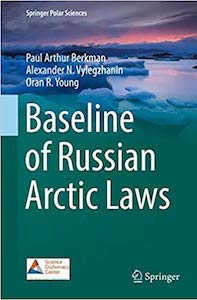 Baseline of Russian Arctic Laws (
Baseline of Russian Arctic Laws (
This book is the first comprehensive and authoritative translation into English of national and international laws of Russia that relate to the Arctic from the early 19th century to the present, revealing the historical and current context of sovereignty, sovereign rights and jurisdiction across nearly half of the north polar region. The Russian original version was coordinated by Igor Sergeyevich Ivanov, former Foreign Minister of the Russian Federation and currently the President of the Russian International Affairs Council. This unique translation complements all legal, geopolitical and governance analyses of the Arctic as a primary source of information, without interpretation or bias. The Baseline of Russian Arctic Laws is a treasure trove for diplomats, scholars and students who are involved with the international environmental, economic and societal dynamics of the Arctic, balancing national interests and common interests to achieve sustainability of the high north for the benefit of all across generations in our globally-interconnected civilization.
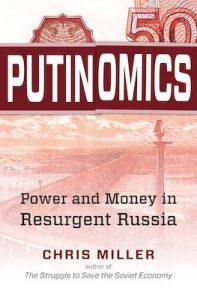 Putinomics: Power and Money in Resurgent Russia (Chris Miller, 2018)
Putinomics: Power and Money in Resurgent Russia (Chris Miller, 2018)
When Vladimir Putin first took power in 1999, he was a little-known figure ruling a country that was reeling from a decade and a half of crisis. In the years since, he has reestablished Russia as a great power. How did he do it? What principles have guided Putin’s economic policies? What patterns can be discerned? In this new analysis of Putin’s Russia, Chris Miller examines its economic policy and the tools Russia’s elite have used to achieve its goals. Miller argues that despite Russia’s corruption, cronyism, and overdependence on oil as an economic driver, Putin’s economic strategy has been surprisingly successful.
Explaining the economic policies that underwrote Putin’s two-decades-long rule, Miller shows how, at every juncture, Putinomics has served Putin’s needs by guaranteeing economic stability and supporting his accumulation of power. Even in the face of Western financial sanctions and low oil prices, Putin has never been more relevant on the world stage.
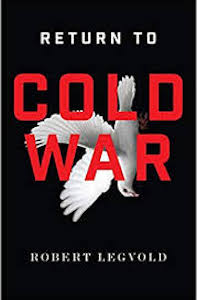
Return to Cold War (Robert Legvold, 2016)
The 2014 crisis in Ukraine sent a tottering U.S.-Russian relationship over a cliff – a dangerous descent into deep mistrust, severed ties, and potential confrontation reminiscent of the Cold War period.
In this incisive new analysis, leading expert on Soviet and Russian foreign policy, Robert Legvold, explores in detail this qualitatively new phase in a relationship that has alternated between hope and disappointment for much of the past two decades. Tracing the long and tortured path leading to this critical juncture, he contends that the recent deterioration of Russia-U.S. relations deserves to be understood as a return to cold war with great and lasting consequences. In drawing out the commonalities between the original cold war and the current confrontation, Return to Cold War brings a fresh perspective to what is happening between the two countries, its broader significance beyond the immediate issues of the day, and how political leaders in both countries might adjust their approaches in order, as the author urges, to make this new cold war “as short and shallow as possible.”
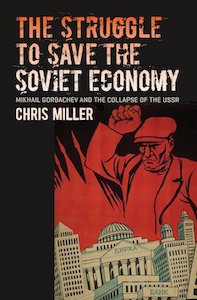 The Struggle to Save the Soviet Economy: Mikhail Gorbachev and the Collapse of the USSR (Chris Miller, 2016)
The Struggle to Save the Soviet Economy: Mikhail Gorbachev and the Collapse of the USSR (Chris Miller, 2016)
For half a century the Soviet economy was inefficient but stable. In the late 1980s, to the surprise of nearly everyone, it suddenly collapsed. Why did this happen? And what role did Soviet leader Mikhail Gorbachev’s economic reforms play in the country’s dissolution? In this groundbreaking study, Chris Miller shows that Gorbachev and his allies tried to learn from the great success story of transitions from socialism to capitalism, Deng Xiaoping’s China. Why, then, were efforts to revitalize Soviet socialism so much less successful than in China?
Making use of never-before-studied documents from the Soviet politburo and other archives, Miller argues that the difference between the Soviet Union and China–and the ultimate cause of the Soviet collapse–was not economics but politics. The Soviet government was divided by bitter conflict, and Gorbachev, the ostensible Soviet autocrat, was unable to outmaneuver the interest groups that were threatened by his economic reforms. Miller’s analysis settles long-standing debates about the politics and economics of perestroika, transforming our understanding of the causes of the Soviet Union’s rapid demise.
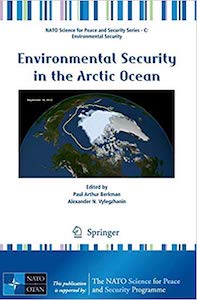
Environmental Security in the Arctic Ocean (Edited by
This seminal book results from a NATO Advanced Research Workshop at the University of Cambridge with Russian co-directorship, enabling the first formal dialogue between NATO and Russia about security issues in the Arctic Ocean. Involving interdisciplinary participation with experts from 17 nations, including all of the Arctic states, this workshop itself reflects progress in Arctic cooperation and collaboration. Interests now are awakening globally to take advantage of extensive energy, shipping, fishing and tourism opportunities in the Arctic Ocean as it is being transformed from a permanent sea-ice cap to a seasonally ice-free sea. This environmental state-change is introducing inherent risks of political, economic and cultural instabilities that are centralized among the Arctic states and indigenous peoples with repercussions globally. Responding with urgency, environmental security is presented as an “integrated approach for assessing and responding to the risks as well as the opportunities generated by an environmental state-change.” In this book – diverse perspectives on environmental security in the Arctic Ocean are shared in chapters from high-level diplomats, parliamentarians and government officials of Arctic and non-Arctic states; leaders of Arctic indigenous peoples organizations; international law advisors from Arctic states as well as the United Nations; directors of inter-governmental organizations and non-governmental organizations; managers of multi-national corporations; political scientists, historians and economists; along with Earth system scientists and oceanographers. Building on the “common arctic issues” of “sustainable development and environmental protection” established by the Arctic Council – environmental security offers an holistic approach to assess opportunities and risks as well as develop infrastructure responses with law of the sea as the key “international legal framework” to “promote the peaceful uses” of the Arctic Ocean. With vision for future generations, environmental security is a path to balance national interests and common interests in the Arctic Ocean for the lasting benefit of all.

